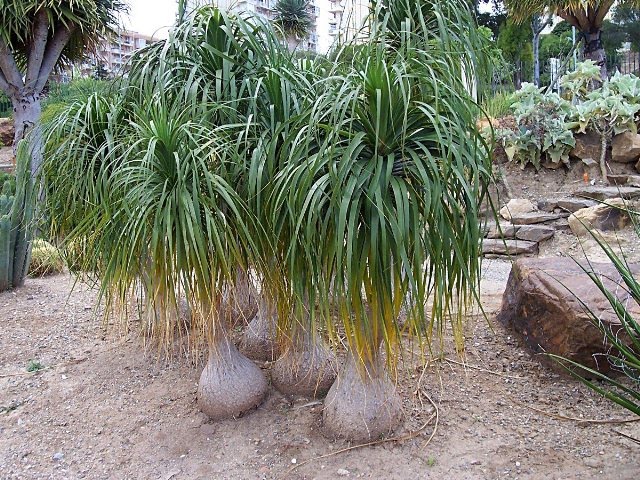 Beaucarnea recurvata (elephant's foot, ponytail palm) is a species of plant in the family Asparagaceae, native to the states of Tamaulipas, Veracruz and San Luis Potosí in eastern Mexico. Despite its common name, it is not closely related to the true palms (Arecaceae). It was discovered in Mexico by a Frenchman in 1870, becoming popular in Europe and worldwide as an ornamental plant. There are 350 year-old Beaucarneas registered in Mexico.
Beaucarnea recurvata (elephant's foot, ponytail palm) is a species of plant in the family Asparagaceae, native to the states of Tamaulipas, Veracruz and San Luis Potosí in eastern Mexico. Despite its common name, it is not closely related to the true palms (Arecaceae). It was discovered in Mexico by a Frenchman in 1870, becoming popular in Europe and worldwide as an ornamental plant. There are 350 year-old Beaucarneas registered in Mexico.It is an evergreen perennial growing to 15 feet 6 inches (4.72 m) with a noticeable expanded caudex, for the purpose of storing water inside. The single palm-like stem produces terminal tufts of strap-shaped, recurved leathery leaves, sometimes hair lock-shaped in the ends, and with occasional panicles of small white flowers once the plant reaches over 10 years of age.

There are 10 different species of this plant, according to the Institute of Ecology in Xalapa, state of Veracruz, which runs the Jardín Botánico Francisco Javier Clavijero botanical garden, where over 400 Beaucarneas are exhibited and more are grown in greenhouses for conservation purposes, in the "Colección Nacional de Beaucarneas" (Beaucarneas National Collection).
Growing Conditions:
Light: Bright light. Ponytail palms can be acclimated to full sun.
Water: During the growing season, water every 7 to 14 days. The bulbous stems store water, so be careful not to overwater. During the winter season, cut back water to monthly.
Temperature: They prefer warm, arid temperatures, above 60ºF. However, they will survive down to 50º, providing they are not exposed to prolonged cold.
Soil: Rich, organic, fast-draining potting soil.
Fertilizer: Feed weekly with liquid fertilizer during the growing season, or use a slow-release pellet fertilizer in the spring. Reduce feeding during the winter.

B. recurvata is often grown as a houseplant or outdoor plant in temperate climate gardens. It is hardy to −5 °C (23 °F), and grows in full sun to light shade. It needs a proper soil mix to drain when watered, and must never be over-watered or mudded, as this will foster pests like the mealybug and cochineal insect. It cannot resist cold temperatures so it must be an indoor plant in countries with strong winters. When repotted it must keep all its roots. To maintain its original shape, the ends of its leaves should not be snipped. It is very slow-growing and drought-tolerant. It has gained the Royal Horticultural Society's Award of Garden Merit.
No comments:
Post a Comment